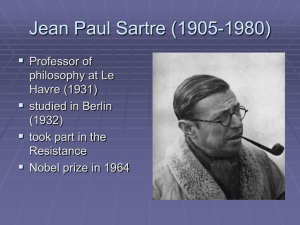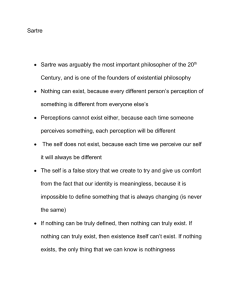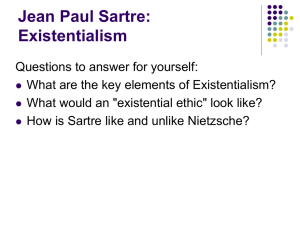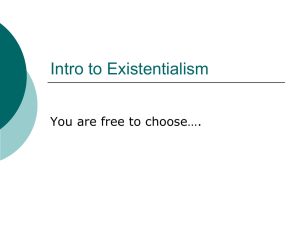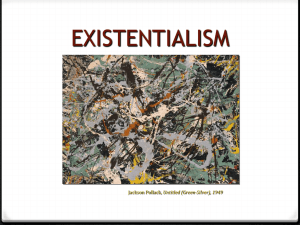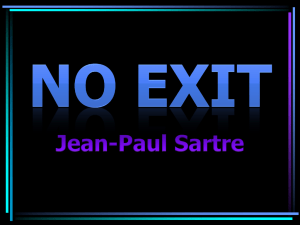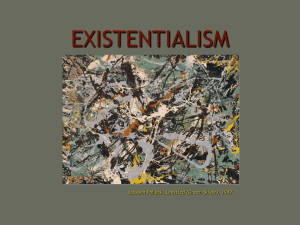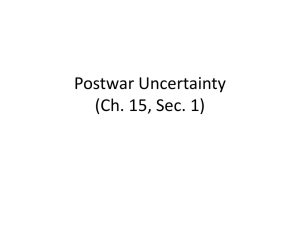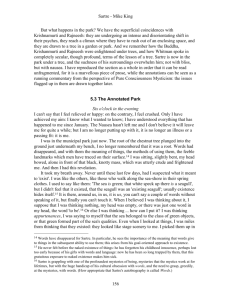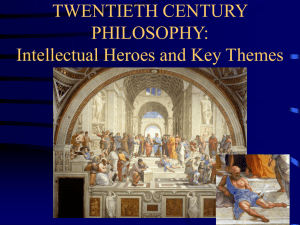Sartre sample essay
advertisement
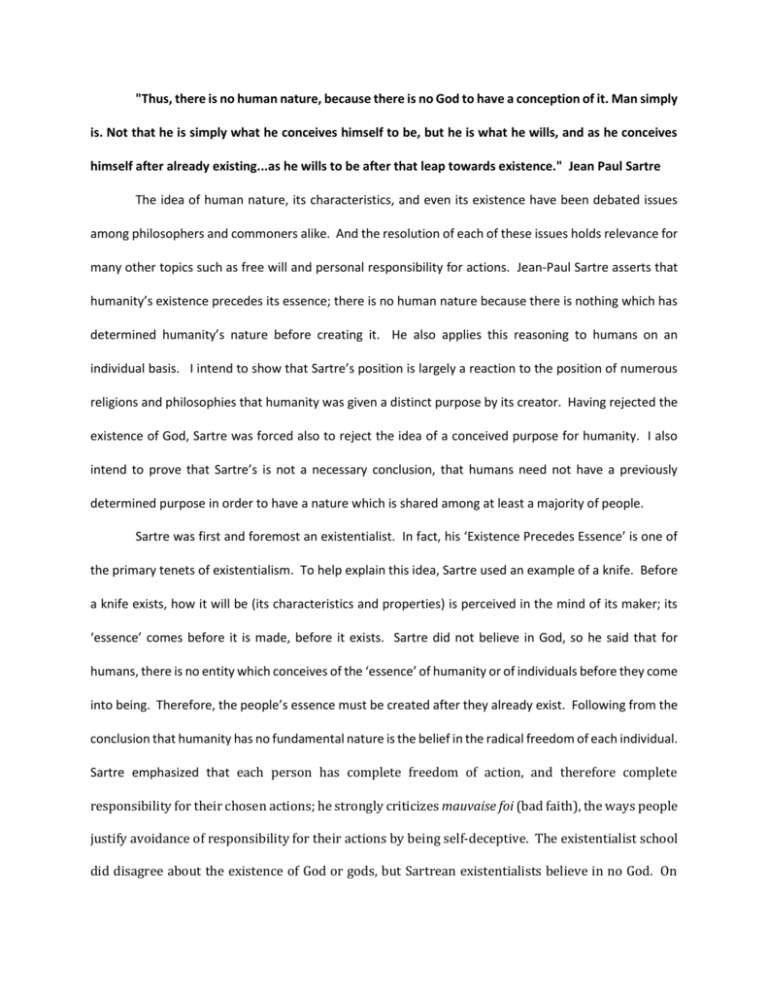
"Thus, there is no human nature, because there is no God to have a conception of it. Man simply is. Not that he is simply what he conceives himself to be, but he is what he wills, and as he conceives himself after already existing...as he wills to be after that leap towards existence." Jean Paul Sartre The idea of human nature, its characteristics, and even its existence have been debated issues among philosophers and commoners alike. And the resolution of each of these issues holds relevance for many other topics such as free will and personal responsibility for actions. Jean-Paul Sartre asserts that humanity’s existence precedes its essence; there is no human nature because there is nothing which has determined humanity’s nature before creating it. He also applies this reasoning to humans on an individual basis. I intend to show that Sartre’s position is largely a reaction to the position of numerous religions and philosophies that humanity was given a distinct purpose by its creator. Having rejected the existence of God, Sartre was forced also to reject the idea of a conceived purpose for humanity. I also intend to prove that Sartre’s is not a necessary conclusion, that humans need not have a previously determined purpose in order to have a nature which is shared among at least a majority of people. Sartre was first and foremost an existentialist. In fact, his ‘Existence Precedes Essence’ is one of the primary tenets of existentialism. To help explain this idea, Sartre used an example of a knife. Before a knife exists, how it will be (its characteristics and properties) is perceived in the mind of its maker; its ‘essence’ comes before it is made, before it exists. Sartre did not believe in God, so he said that for humans, there is no entity which conceives of the ‘essence’ of humanity or of individuals before they come into being. Therefore, the people’s essence must be created after they already exist. Following from the conclusion that humanity has no fundamental nature is the belief in the radical freedom of each individual. Sartre emphasized that each person has complete freedom of action, and therefore complete responsibility for their chosen actions; he strongly criticizes mauvaise foi (bad faith), the ways people justify avoidance of responsibility for their actions by being self-deceptive. The existentialist school did disagree about the existence of God or gods, but Sartrean existentialists believe in no God. On account of this, humanity is alone in the world, and therefore in anguish over the fact that each individual has no basis for morality and must choose his own values and morals. Sartre’s quote clearly demonstrates his belief in atheism, existence preceding essence, and radical freedom and the ensuing responsibility. Some members of the empiricist school would agree with some of Sartre’s positions. Their rejection of innate ideas and Locke’s tabula rasa fit quite well with Sartre’s view of human nature. But Sartre’s positions are, as one should expect, not without criticism. Herbert Marcuse was one critical of his philosophy. Marcuse argued that Sartre observed characteristics of life in a modern society such as feelings of purposelessness and anxiety, and tried to extrapolate them to existence on the whole. He said that Sartre tried to force historical realities of the world on top of human nature. Roger Scruton was another to criticize existentialism. He argued that aspects of the philosophy were contradictory; he pointed out that while Sartre said there was no human nature and no universal morality, he also said that the self-deception of bad faith and avoidance of responsibility were universally to be avoided. He was unconvinced of the basis on which Sartre asserted the validity of his self-made morality, which is intended to apply to all people. Scruton additionally points out that if indeed Sartre’s own arguments are correct, then his position and morality can have no objective or universal weight. Heidegger also criticized Sartre’s existentialism. He characterized it as a mere reversal of previous metaphysical theories of human nature. He argued that “the reversal of a metaphysical statement remains a metaphysical statement.” He said that by only responding to previous thought and not reconsidering the definitions of essence and existence, Sartre is completely oblivious of the actual truth of existence. I both agree and disagree with Sartre. I, like him, do not believe that a God or gods conceives of people’s nature before they exist. I agree that we are alone in an indifferent universe (until there is evidence of intelligent life elsewhere). Human nature had for so long, across so many cultures and religions, been attributed to the work of God. When Sartre rejected the existence of God, he necessarily had also to reject him as a source of human nature. Sartre chose not to replace him with anything. While I agree with him that God is not the source of human nature, I do not agree that humanity therefore has no nature. To use his example of a knife, humans can have no universal nature because nothing conceives of it before creating them, and they have to create their nature for themselves, while the knife’s essence does precede its existence, as it is conceived before the knife is created. This means that only things which were created can have an essence which precedes their existence. I do not think this is the case. For example, atoms have a very specific nature. All atoms are composed of the same particles, and these particles can all be broken down into smaller components which are at present called quarks. While these things have no need to be conceived of and created in order to exist, they certainly do not exist and then decide on their properties. Their existence and essence arise simultaneously. Many components of the universe are similar. Electricity, gravity, magnets, and water all have characteristics not requiring a creator, but none of them gain these properties at a time after they began to exist. Humans are similar. Their nature is encoded in the brain. It can be altered by events and by substances such as drugs and hormones. The basic human nature of a desire for survival and reproduction, and to some degree altruistic, is encoded in the normal brain at birth. As the brain grows, develops, and experiences the world, so too does the individual’s nature grow and develop. Sartre’s explanation for human nature is insufficient because it is too logical. There are too many aspects of personality, emotions, and desires, all part of human nature, which cannot be explained by simple logic. The bond between parents and children goes beyond basic logic. There are too many subconscious and unconscious aspects of the human mind for human nature to be a chosen thing. Humanity’s essence is not a static quality chosen before or after existence. It comes into being at the same time as existence, and develops constantly. Humanity does have a nature, as an abundance of characteristics are shared between people, but it is not nearly as clearcut an issue as Sartre believes. Human nature cannot be something simply decided by logic. Decision-making processes are influenced by an immense amount of activity in the brain, a large part of it not controlled by logic. So man cannot have logically decided upon his nature. But, without the certainty either that God created human nature, or that it was decided upon by each individual with complete freedom, the concept is much less distinct. With this reduced clarity come a great deal more questioning regarding other topics such as responsibility, free will and sincerity. Can people be held responsible for their actions? What degree of individual will is responsible for individual decisions? If emotions are not based on logic and not decided, can people’s feelings for each other be called good or bad? Is love and admiration a compliment if it is a subconscious response? The question of human nature opens many other lines of inquiry concerning our experience.

